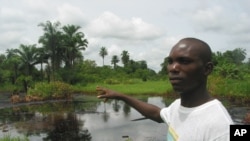The massive BP oil spill and cleanup in the Gulf of Mexico are bringing renewed attention to the many spills taking place in Nigeria's oil-rich Niger Delta region. Activists in the United States say environmentalists in Nigeria should seize current attention on the problem to get Nigeria's government and oil companies to clean up in the Niger Delta as well.
The editor of the Washington-based Africa Focus Bulletin website, William Minter, recently posted research that has been done on Niger Delta oil spills under the heading, 'US/Nigeria, By Way of Comparison'.
"There are estimated to be several thousand spills, smaller spills a year, but they add up in the Niger Delta. I think the difference is just that attention gets paid when it happens close to the United States, when it is a big dramatic incident and there is immediate political pressure on the company and on the government at all levels to do something about it," he said.
Research by the World Conservation Union and Nigerian government agencies indicate that on average every year over the past 50 years the oil spilled in Nigeria has been equivalent to the 1989 Exxon Valdez spill in Alaska.
That spill was estimated at about 250,000 barrels.
The BP spill in the Gulf of Mexico is estimated to have reached three times the amount of the Exxon Valdez spill.
The coordinator of the San Francisco-based Justice in Nigeria Now advocacy group Abby Rubinson hopes current attention on spills will eventually bring a similar response in Nigeria. "The conversations that people have here in the United States about how it is going to affect tourism and fishermen in the Gulf are going to have to find a new livelihood, pictures of the birds and fish covered in oil, all those things, it has been happening in Nigeria for the past 50 years. I mean if there are measures that work here, if there are things that the government is doing, that the oil companies are doing, that results in proper clean up here, they should be doing the same thing in Nigeria," Rubinson said.
What also worries activists like Rubinson is that in Nigeria as well as other parts of West Africa, deepwater drilling at below 15-hundred meters is significant. "The oil is further away, deeper and it is new technology or new situations. The likelihood that something will go wrong is higher. It is harder to respond when the situation is so far offshore and so deep. So if this is any indication of what happened here, I cannot imagine it would be any better in Nigeria," Rubinson said.
The BP explosion took place at deep levels where lots of drilling is expected in the years ahead in the Gulf of Guinea.
Minter says Nigerian environmentalists should use the Internet to make their case. He says the Ushahidi website which was established in Kenya to track post-election violence would be a good model.
Ushahidi means "testimony" in Swahili. The website established a crisis information system to which citizens contributed via mobile phone. "You can use SMS messages (shorth message service) and have them show up on a database. I am sure there are Nigerian programmers and activists who are computer-savvy who could hook up with Ushahidi and maybe bring greater visibility to the situation in the Delta with an online database. You could even link in to videos," he said.
For the time being, activists say cleanups could easily take place in the Niger Delta to help local communities, and that simple solutions such as repairing or replacing old pipes would help limit spills. They say public pressure is needed to bring about change, since in Nigeria's context, laws, such as ones to limit gas flaring, have not been properly enforced.
One of the companies which has been accused of causing the most spilling in Nigeria is Shell. Earlier this year, it admitted to spilling 14,000 tons of oil in 2009.
But the Anglo-Dutch company, which works in partnership with Nigeria's government in the Niger Delta, says that nearly all of its oil spills are caused by theft, vandalism and sabotage by militants, and very little by deteriorating infrastructure. Militants say they are fighting for equal distribution of oil wealth in the Niger Delta where most people remain poor despite decades of oil extraction from their region.
BP Oil Spill Brings New Attention to Nigeria's Many Spills
- By David Dyar




